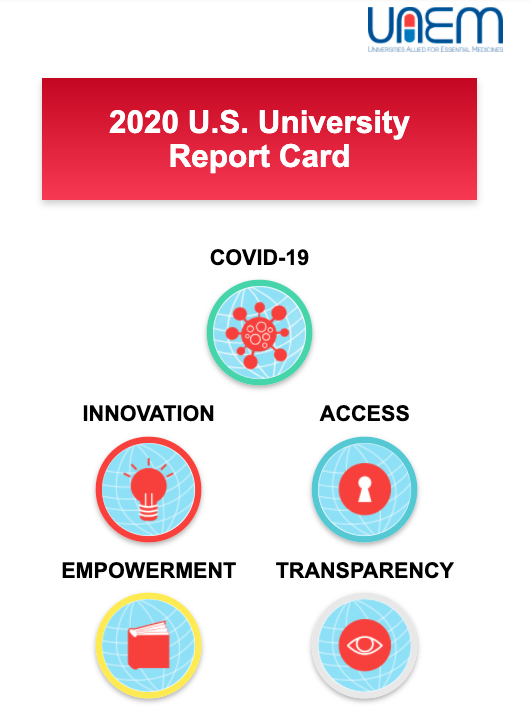Universities Allied for Essential Medicines (UAEM) released its 2020 U.S. University Report Card: Global Equity and Biomedical Research on March 30. The report card looks at the top sixty research universities in the US and scrutinizes their biomedical research and development (R&D) policies, practices, and performance in domestic and neglected global public health needs in access to medicines, including their COVID-19 response.

Universities were graded in the following categories: Access, Innovation, Empowerment, and new this year Transparency and COVID-19. As of publishing, of the sixty research universities, only two institutions have received the highest grade, which is a “B-” (Harvard University and Georgetown University). A stark contrast to the majority of failing grades, even with a generous grading curve. Below are some of the key findings from the report:
- Fifteen percent of universities devoted no research funding to global health research; most devote 1-5%.
- Fifteen percent of schools devoted no medical research funding to neglected diseases; most devote 0.51-1.0%.
- Between 11% and 30% of university biomedical research is published in open-access journals.
- NO universities reported having policies that require researchers publish all the results of their clinical trials.
- Half of the universities have made no commitments to equitable COVID-19 biomedical licensing practices.
Some universities, however, do continue to make improving access to medicines and their grade a priority. For example, Georgetown University was “extremely pleased that its efforts in socially-responsible licensing and related policy have been recognized by this significant change in our UAEM “report card” score”.
Despite ranking in the “Overall Top Ten” and accepting millions of dollars of public funding for COVID-19, the following universities have made ZERO public commitments to equitable COVID-19 biomedical licensing. This means that there will be limited to no protection for the public of access or affordability of COVID-19 innovations developed on these campuses.
- The University of North Carolina at Chapel Hill
- 26 COVID-19 research projects and $91,322,135 total public funding
- University of Washington, Seattle
- 3 COVID-19 projects, $21,473,537 total public funding
- Case Western Reserve University
- 4 COVID-19 projects, $3,020,526 total public funding funding
Merith Basey, Executive Director of UAEM North America highlights the urgent need for universities to share their IP: “Universities have a moral and ethical responsibility to the public to openly share the intellectual property on the taxpayer-funded COVID-19 vaccines, therapeutics, and diagnostics we all paid to invent. [Through Operation Warp Speed, $16 billion of American taxpayer money has been spent on the virus.] How many more thousands have to die before American universities decide to act? If not now, when nearly 555,000 of their fellow citizens have perished, then when? None of us will truly be safe until people all over the world can have access to a COVID-19 vaccine. We are calling on universities to take action now by sharing their IP and know-how via the WHO-recognized mechanisms, including the Open COVID Pledge and C-TAP. There is no time to waste.”

